新概念第一册Lesson38-39
新概念第一册39课课文

新概念第一册39课课文39 LessonAfter dinner, Mr. Harris said, "I'm going to a village near here tomorrow, and I shall walk there. If anyone would like to come with me, we'll meet here after breakfast."The next morning, nine people were ready to start. George, however, was not there. George was usually late for everything."Where's George?" asked Mr. Harris."Here he is!" said Tom. George was in the distance, running towards them as fast as he could go."I didn't sleep very well last night," he said. "I had a strange dream. I dreamt that I was a wheel of a car and I was going round and round. When I woke up, I felt very dizzy. Do you think the dream means anything, Mr. Harris?""No," said Mr. Harris, laughing. "Dreams never mean anything."In the village, they went to a little shop and had tea. After that, they walked back to the hotel. They arrived just in time for dinner.Chinese translation:第39课晚饭过后,哈里斯先生说:“我明天要去附近的一个村庄,打算步行去。
新概念第一册39课课文

新概念第一册39课课文新概念第一册第39课的课文是《The Ideal Teacher》(理想的教师)。
这篇课文主要讲述了理想的教师应该具备的品质和特点。
首先,理想的教师应该具备广博的知识和丰富的教学经验。
他们应该对所教授的学科有深入的了解,并能将知识以简单明了的方式传授给学生。
他们应该保持学习的态度,不断更新自己的知识,以便更好地指导学生。
其次,理想的教师应该具备良好的沟通和表达能力。
他们应该能够清晰地传达信息,引发学生的兴趣,并能够激发学生的思考和探索精神。
他们应该善于倾听和理解学生的问题和困惑,并能够给予恰当的指导和帮助。
此外,理想的教师应该具备耐心和关爱的品质。
他们应该能够理解学生的不同需求和能力,并能够给予个别化的关注和指导。
他们应该鼓励学生克服困难,激发他们的学习动力,并给予积极的反馈和鼓励,帮助学生建立自信和自尊。
另外,理想的教师还应该具备激励和启发学生的能力。
他们应该能够通过丰富多样的教学方法和活动,激发学生的学习兴趣和创造力。
他们应该能够引导学生思考和探索,培养学生的批判性思维和解决问题的能力。
最后,理想的教师应该是一个榜样和引导者。
他们应该具备良好的道德品质和价值观,以身作则,对学生起到良好的示范作用。
他们应该能够引导学生树立正确的价值观和人生观,培养学生的道德品质和社会责任感。
综上所述,理想的教师应该具备广博的知识、良好的沟通能力、耐心和关爱的品质、激励和启发学生的能力,以及良好的道德品质和价值观。
他们的目标是帮助学生全面发展,培养他们的学术能力、思维能力和品德素养。
新概念英语第一册第39课
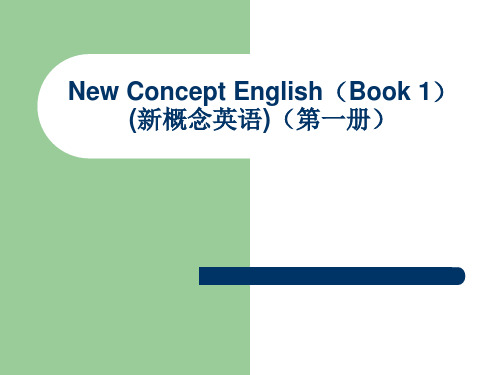
I am going to put it on the table.变一般疑问句 Are you going to put it on the table? 变回答 Yes, I am. / No, I’m not.变否定句 I am not going to put it on the table.划线 I Who is going to put it on the table? 划线 put it on the table. What are you going to do? 划线 it What are you going to put on the table? 划线 table Where are you going to put it?
going to = gonna
Lesson 40 What are you going to do? 你准备做什么? I’m going to… 我准备……
New words and expressions
show
[ʃəʊ] v. 给……看 send [send] v. 送给 take [teik] v. 带给
★ show
Don’t drop it! Drop me a line/letter.给我写信。 drop sb. a line 给某人写一封信 e.g. Drop me a line when you are free. 你有空给我写一封信。
n. 滴 e.g. a drop of water 一滴水 e.g. some drops of water 几滴水
练习 She is going to show the flowers to her mother. 1.一般疑问句 2.回答 3.否定句 4.划线She 5.划线show the flowers to her mother 6.划线 the flowers 7.划线 her mother Whom is she going to show the flowers to?
新概念第一册Lesson38-39
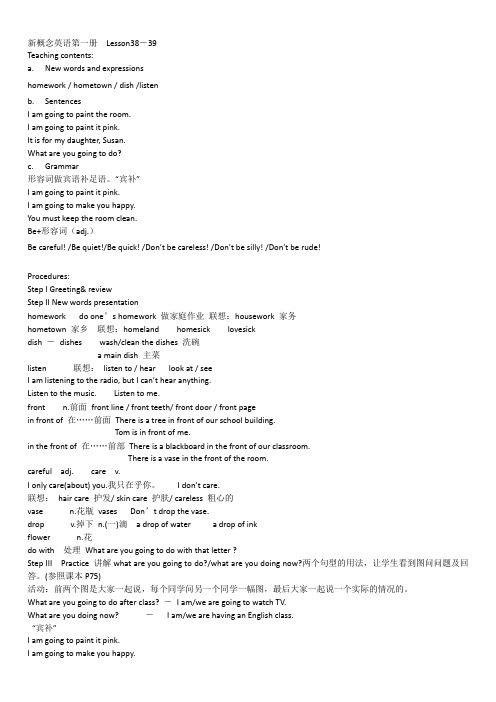
新概念英语第一册Lesson38-39Teaching contents:a. New words and expressionshomework / hometown / dish /listenb. SentencesI am going to paint the room.I am going to paint it pink.It is for my daughter, Susan.What are you going to do?c. Grammar形容词做宾语补足语。
“宾补”I am going to paint it pink.I am going to make you happy.You must keep the room clean.Be+形容词(adj.)Be careful! /Be quiet!/Be quick! /Don’t be careless! /Don’t be silly! /Don’t be rude!Procedures:Step I Greeting& reviewStep II New words presentationhomework do one’s homework 做家庭作业联想:housework 家务hometown 家乡联想:homeland homesick lovesickdish -dishes wash/clean the dishes 洗碗a main dish 主菜listen 联想:listen to / hear look at / seeI am listening to the radio, but I can’t hear anything.Listen to the music. Listen to me.front n.前面front line / front teeth/ front door / front pagein front of 在……前面There is a tree in front of our school building.Tom is in front of me.in the front of 在……前部There is a blackboard in the front of our classroom.There is a vase in the front of the room.careful adj. care v.I only care(about) you.我只在乎你。
新概念第一册Lesson+39+Don't+drop+it讲义

Lesson 39 Don’t drop it!一.课内注解1.Don’t drop it!drop(1)v.掉落;(失手)落下;掉下;放下She drops her knife . 她放下刀叉.(2)v. (使)滴下;滴水Water drops from the roof. 水从屋顶上滴下来。
(3)v. 下降;降低Yesterday the temperature dropped to zero. 昨气温下降至零度。
(4)n. 滴 a drop of waterThere is a drop of water in the bottle. 瓶子里有一滴水。
2.What are you going to do with that vase?(1)be going to do 将要做.......;打算做.......They are going to play the game next day. 他们打算明天玩游戏。
(2)vase n.花瓶Mike has many nice vases. 麦克有很多漂亮的花瓶。
(3)do with =deal with 处理;解决How to deal with it = What to do with it 如何解决它(4)with that vase 用那个花瓶with 介词:用,有with +doing /n. 反义词:without 没有;without doing sth. /sth.3.put it on this/the table(1)put on 穿上反义词take off 脱下He puts on a new suit. 他穿上一套新西装。
(2)put it on 把它放在.......She put them on the shelf. 她把他们放在了架子上。
(3)上演;上映The cinema puts on a new film. 电影院上映了一部新电影。
新概念英语第一册课堂笔记-第38课

新概念英语第一册课堂笔记-第38课新概念英语第一册课堂笔记-第38课复习语法点1.陈述句主语+be动词This is a pen./ They are students.am / is / are否定形式在be后加not2.一般疑问句、特殊疑问句一般疑问句是以be动词、情态动词(must、can)、do或does,did,have,has,was,were打头的句子。
Are you a student? / Is she a worker?一般疑问句能够用简单的“是”或“不是”来回答用什么样的动词提问,就用什么样的动词来回答特殊疑问句是由特殊疑问词和一般疑问句来构成。
特殊疑问词有:what、how……特殊疑问句一般不能够用简单的“是”或“不是”来回答,而要根据不同的疑问词来回答。
选择疑问句以be动词构成的选择疑问句+or构成选择Are you a student or a worker.Is she an American or an English?所有能做为一般疑问句后面加一个or选项,来构成选择疑问句。
在回答选择疑问句时,要根据具体的情况来回答。
名词所有格名字+’s代词的用法主格,宾格,形容词性的物主代词,名词性的物主代词主格只能做主语宾格用在介词和动词之后形容词性的物主代词不能单独使用,后面要跟名词名词性的物主代词只能单独使用,相当于形容词性的物主代词加名词名词所有格能够是形容词性的,也能够是名词性的。
如果是形容词性时,后面加名词;如果是名词性的,后边不加东西。
介词短语做后置定语一个词来修饰成分时,放在修饰词的前边;而一个词组来做修饰成分时,放在被修饰词的后边。
the book on the desk介词的学习1.跟在be动词之后2.在普通的动词之后put on / take off动词加介词构成新的意义学习介词的规则:1.记清介词本身表示的意义2.1)跟在be动词之后,表示方位(这种情况较多)2)与普通的行为动词构成新的意义名词种类有五种:普通名词、物质名词、专有名词、集体名词、抽象名词可数名词的单、复数概念There be句型1.表示某处有某物2.使用的类型:1)There is…+(单数的可数名词或不可数名词)2)There are…+(可数名词的复数)冠词有不定冠词或定冠词两类。
新概念英语第一册Lesson 38
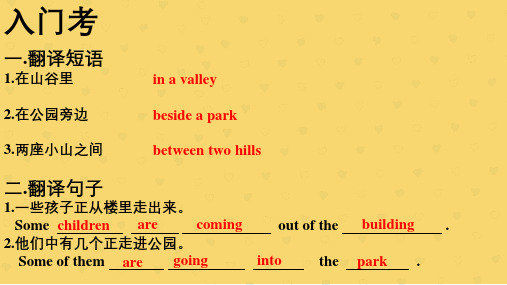
4.They are (be) going to eat (eat).
Lesson 38练习册 Lesson 38笔记
下次上课时间 4月25号星期六 1-3
预习Lesson 37课文
入门考
一.翻译短语
1.在山谷里
in a valley
2.在公园旁边
beside a park
3.两座小山之间
between two hills
二.翻译句子
1.一些孩子正从楼里走出来。
Some children are
coming
out of the building .
2.他们中有几个正走进公园。
Some of them are going
into the park .
Lesson 38
homework
/ˈhəʊmwɜ:k/
n.作业
listen
/ˈlɪsn/
v.听
dish
/dɪʃ/
n.盘子;碟子
做作业
do homework
洗餐具
do the dishes
听音乐
listen to music
等公交车
wait for a bus
4.They are shaving.(变一般疑问句) Are they shaving?
1.I’m going to wait for a bus.(划线部分提问) What are you going to do ?
2.He is going to shave.(改为否定句) He isn’t going to shave.
新概念英语第一册39课(课堂PPT)

drop out : 退出,退学
11
★ flower :n. 花(通称) flour: 面粉(同音词) flower bed 花坛 flower girl 卖花女孩
12
What are they talking about?
13
Questions on the text
1. What is Penny going to do with the vase?
(别傻了。)
祈使句也常把主语“You”表达出来,使对方听起
来觉得柔和些,例如:
You go and tell him, Chris.
(克立斯你去告诉他。)
18
❖Don’t drop it! ❖祈使句 ❖Stand up. Don’t stand up. ❖Sit down. Don’t sit down.
in the front of 在...(范围内)的前面
(属于同一范)
There is a mountain in front of the house。 房子前面有一座山 There is a blackboard in the front of the classroom。如:教师前面是一块黑板
❖ 头脑风暴:说祈使句。
19
20
5
The teacher is standing in front of the blackboard. ❖The vase is in front of you. ❖There is a blackboard in the front of the classroom.
6
—Is this your son's sweater? —No. His is on the chair ______ the
新概念一第一册39课单词

新概念一第一册39课单词新概念英语第一册第39课的单词包括:1. ache 疼痛,疼痛感。
2. ambulance 救护车。
3. appointment 约会,预约。
4. bandage 绷带。
5. bleed 流血。
6. bruise 擦伤,瘀伤。
7. chemist 药剂师,药店。
8. chest 胸部。
9. cough 咳嗽。
10. dentist 牙医。
11. disease 疾病。
12. drug 药物。
13. examine 检查,审查。
14. faint 昏倒,晕厥。
15. fever 发烧。
16. flu 流感。
17. headache 头痛。
18. injection 注射。
19. medicine 药品,医学。
20. nurse 护士。
21. operation 手术。
22. pain 疼痛。
23. patient 病人。
24. pharmacy 药房。
25. prescription 处方。
26. recover 恢复,康复。
27. sore 疼痛的,痛处。
28. stomachache 胃痛。
29. surgeon 外科医生。
30. symptom 症状。
31. tablet 药片。
32. temperature 体温。
33. throat 喉咙。
34. toothache 牙痛。
35. treatment 治疗。
36. virus 病毒。
37. wound 伤口。
38. X-ray X光。
39. yawn 打哈欠。
以上是新概念英语第一册第39课的单词。
希望能对你有所帮助。
英语新概念第一册第39课

英语新概念第一册第39课
英语新概念第一册共有60课,第39课的主题是"An
interesting story"(一个有趣的故事)。
在这一课中,故事讲述
了一个男人在火车上遇到了一个陌生人,并与他进行了一次有趣的
对话。
这个故事通过对话的形式展开,男人首先向陌生人询问了他的
职业和家庭情况。
陌生人回答说他是一名化学家,有一个妻子和两
个孩子。
接着,男人问起陌生人是否曾经遇到过什么有趣的事情。
陌生人回忆起一次他在火车上遇到了一个非常怪异的人,他穿着一
身奇特的服装,还带着一只大狗。
陌生人描述了他与这个怪异人的对话,怪异人声称自己是一个
外星人,并且告诉陌生人一些关于外星人文化和科技的事情。
陌生
人对此感到非常惊讶,但他也怀疑这个怪异人是否真的是外星人。
故事以陌生人对男人说,他并不确定那个怪异人是否真的是外
星人,但他相信在这个广阔的宇宙中,可能存在着其他的生命形式。
男人对此表示赞同,并且认为人类应该保持开放的心态,去探索和
了解更多关于宇宙的奥秘。
通过这个故事,课文让我们思考了一些关于宇宙和外星生命的问题。
它提醒我们保持对未知事物的好奇心和开放的态度,不断探索和学习。
这个故事也展示了人与人之间的交流和对话的重要性,通过对话,我们可以分享和传递知识、经验和观点。
总的来说,第39课的故事以一个有趣的对话形式呈现,通过描述一个男人与一个陌生人的交流,引发了关于宇宙和外星生命的思考。
这个故事提醒我们保持好奇心和开放的态度,以及交流和对话的重要性。
新概念英语第一册所有语法点汇总)
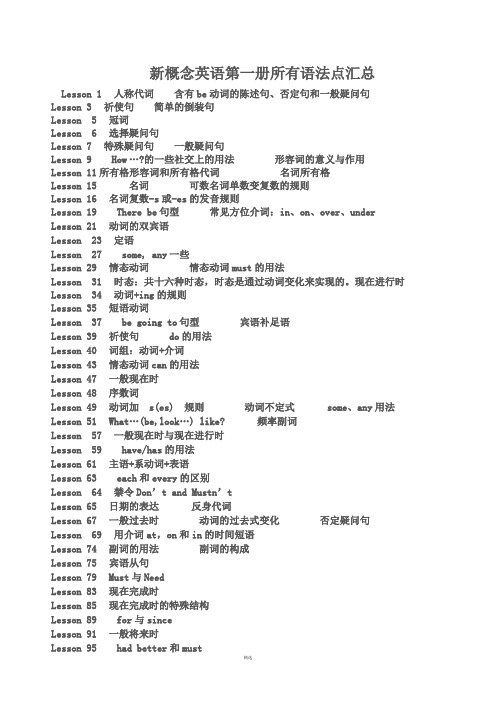
新概念英语第一册所有语法点汇总Lesson 1 人称代词含有be动词的陈述句、否定句和一般疑问句Lesson 3 祈使句简单的倒装句Lesson 5 冠词Lesson 6 选择疑问句Lesson 7 特殊疑问句一般疑问句Lesson 9 How…?的一些社交上的用法形容词的意义与作用Lesson 11所有格形容词和所有格代词名词所有格Lesson 15 名词可数名词单数变复数的规则Lesson 16 名词复数-s或-es的发音规则Lesson 19 There be句型常见方位介词:in、on、over、under Lesson 21 动词的双宾语Lesson 23 定语Lesson 27 some, any一些Lesson 29 情态动词情态动词must的用法Lesson 31 时态:共十六种时态,时态是通过动词变化来实现的。
现在进行时Lesson 34 动词+ing的规则Lesson 35 短语动词Lesson 37 be going to句型宾语补足语Lesson 39 祈使句do的用法Lesson 40 词组:动词+介词Lesson 43 情态动词can的用法Lesson 47 一般现在时Lesson 48 序数词Lesson 49 动词加s(es) 规则动词不定式some、any用法Lesson 51 What…(be,look…) like? 频率副词Lesson 57 一般现在时与现在进行时Lesson 59 have/has的用法Lesson 61 主语+系动词+表语Lesson 63 each和every的区别Lesson 64 禁令Don’t and Mustn’tLesson 65 日期的表达反身代词Lesson 67 一般过去时动词的过去式变化否定疑问句Lesson 69 用介词at,on和in的时间短语Lesson 74 副词的用法副词的构成Lesson 75 宾语从句Lesson 79 Must与NeedLesson 83 现在完成时Lesson 85 现在完成时的特殊结构Lesson 89 for与sinceLesson 91 一般将来时Lesson 99 宾语从句Lesson 100 直接引语和间接引语Lesson 101 反意疑问句Lesson 103 too与enough的用法Lesson 105 动词不定式Lesson 107 形容词的比较级和最高级Lesson 111 形容词的平级比较级Lesson 113 so与neither引导的简短回答Lesson 116 不定代词Lesson 117 过去进行时概念和结构Lesson 119 过去完成时Lesson 121 定语从句Lesson 123 感叹句Lesson 125 must, have to和needn’tLesson 127 表示猜测和推断的情态助动词must和can’tLesson 131 情态助动词may表示可能性Lesson 133 需改变时态的间接陈述句Lesson 135 Let的用法Lesson 137 条件从句Lesson 141 被动语态新概念英语第一册语法点归纳大纲新概念英语第一册语法点归纳新概念一共144课,其中单课为课文,双课为语法和练习。
新概念英语青少年版第一册第38课:It’stimeforbed.

ห้องสมุดไป่ตู้
下载word文档到电脑方便收藏和打印全文共362字
睡觉时间到了。
Mother: Hurry up,children.It’s time for bed. 母亲: 快点,孩子们该睡觉了。 Sue: Oh!We’re not sleepy,mum. 苏: 噢,我们不困,妈妈。 Sandy: I don’t want to go to bed.I want to watch television. 桑迪: 我不想睡觉我想看电视。 Sue: I want to watch television,too. 苏: 我也想看电视。 Mother: All right then.You can watch television for ten minutes. 母亲: 那好吧,你们看十分钟电视。 Father: Are the children in bed,Betty? 父亲: 孩子们睡觉了吗?贝蒂? Mother: No,they’re watching television. 母亲: 不,他们在看电视。 Father: Sandy!Sue!It’s time for bed. 父亲: 桑迪!苏!该睡觉了。 Look at them!They’re both fast asleep!
英语新概念第一册第39课
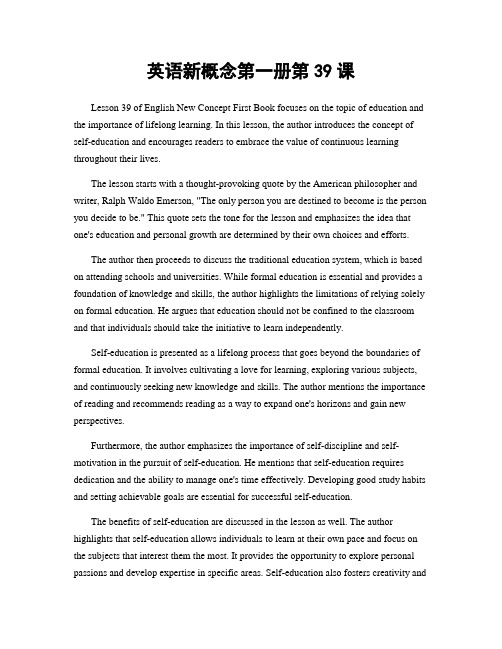
英语新概念第一册第39课Lesson 39 of English New Concept First Book focuses on the topic of education and the importance of lifelong learning. In this lesson, the author introduces the concept of self-education and encourages readers to embrace the value of continuous learning throughout their lives.The lesson starts with a thought-provoking quote by the American philosopher and writer, Ralph Waldo Emerson, "The only person you are destined to become is the person you decide to be." This quote sets the tone for the lesson and emphasizes the idea that one's education and personal growth are determined by their own choices and efforts.The author then proceeds to discuss the traditional education system, which is based on attending schools and universities. While formal education is essential and provides a foundation of knowledge and skills, the author highlights the limitations of relying solely on formal education. He argues that education should not be confined to the classroom and that individuals should take the initiative to learn independently.Self-education is presented as a lifelong process that goes beyond the boundaries of formal education. It involves cultivating a love for learning, exploring various subjects, and continuously seeking new knowledge and skills. The author mentions the importance of reading and recommends reading as a way to expand one's horizons and gain new perspectives.Furthermore, the author emphasizes the importance of self-discipline and self-motivation in the pursuit of self-education. He mentions that self-education requires dedication and the ability to manage one's time effectively. Developing good study habits and setting achievable goals are essential for successful self-education.The benefits of self-education are discussed in the lesson as well. The author highlights that self-education allows individuals to learn at their own pace and focus on the subjects that interest them the most. It provides the opportunity to explore personal passions and develop expertise in specific areas. Self-education also fosters creativity andcritical thinking, as individuals are encouraged to question and analyze the information they come across.Moreover, the author emphasizes the role of technology in facilitating self-education. He mentions that the internet provides a vast amount of information and resources that can be accessed anytime and anywhere. Online courses, educational videos, and e-books are just a few examples of the resources available for self-education. The author encourages readers to take advantage of these resources and incorporate them into their self-education journey.In conclusion, Lesson 39 of English New Concept First Book promotes the idea of self-education and lifelong learning. It highlights the limitations of traditional education and encourages individuals to take charge of their own education. By cultivating a love for learning, developing self-discipline, and utilizing the resources available, individuals can embark on a fulfilling journey of self-education and personal growth. Remember, education is not just limited to the classroom, and the choice to become a lifelong learner is in our hands.。
Lesson38(课件)新概念英语第一册
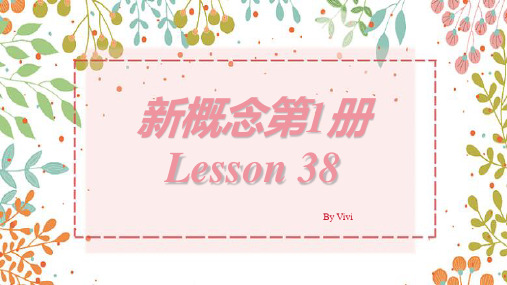
He isn’t going to play basketball tomorrow.
肯定回答:Yes, he is.
否定回答:No, he isn’t.
Exercise
1. 我们打算下周去买一本英语书.(翻译并改为否定句 以及一般疑问句) We are going to buy an English book next book.
We are not going to buy an English book next book.
What are you going to do? We are going to listen to the stereo.
Text learning
What are you doing now? I’m washing the dishes now.
What are you going to do? I’m going to wash the dishes.
用be going to对应的形式填空。 1.I _a_m__g_o_i_n_g_t_o_g_o_ (go) to the cinema this evening. 2.My parentsa_r_e_g_o_i_n_g_t_o__cl_e_a_n_ (clean) the house tomorrow.
3.They a_r_e__g_o_in_g__to__j_o_in_(join) the party tomorrow evening.Exercise
Lesson38Whatareyougoingtodo_(课件)新概念英语第一册

Answer these questions like the example.
1. Is he painting the bookcase now? No, he isn’t, but he’s going to paint the bookcase.
No, she isn’t. 4. What are the children doing (do)?
They are jumping off the tree.
三、句型转换(对划线部分提问)。
1. George is going to paint the bookcase. What is George going to do ?
2. Are you putting on your coat?
No, I’m not, but I’m going to put on my coat. 3. Is she washing the dishes?
No, she isn’t, but she’s going to wash the dishes. 4. Are they doing their homework?
3. He is going to shave. He’s going to shave.
4. I am going to listen to the stereo. I’m going to listen to the stereo.
5. You are going to work hard. You’re going to work hard.
No, they aren’t, but they’re going to do their homework.
新概念第一册Lesson38-39
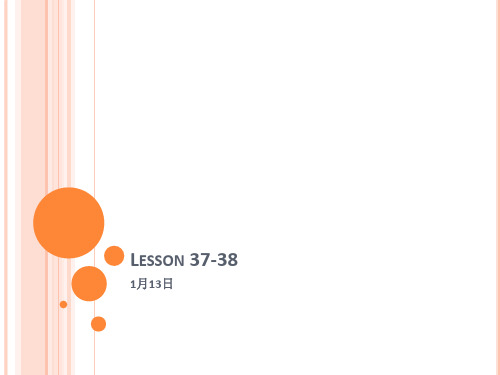
e.g. What colour are you going to paint the bookcase? 你打算把书橱涂上什么颜色?
Hard adj. 坚硬的,困难的,努力的 e.g. The ice is as hard as rock. 这块冰硬得像一块石头。 Hard-working Hard work Hard-hearted 勤奋的 艰苦的工作 心肠硬的
Make v. 做 Make ------making
Make the tea Make the coffee Make the bed 铺床 Make a meal 做饭 e.g. His mother is making a meal. 他的妈妈正在做饭。 e.g. Their parents are making the meal. 他们的父母正在做饭。
Favourite adj. 最喜欢的 n. 最喜欢的东西 e.g. These books are my favourites. = These are my favourite books. 这些是我最喜欢的书。 e.g. This kind of chocolate is my favourite. 这种巧克力是我的最爱。 这是我最喜欢的游戏。(该怎么说呢?)
Work v. 工作 Work hard 努力工作 Hard work 艰苦的工作 Hard-working 勤奋努力
e.g. He is a hard-working employee. 他是个勤奋的雇员 e.g. We must work hard. 我们必须努力工作 e.g. That’s hard work. 那是艰苦的工作
Make it : succeed 成功了 e.g. I can make it. 我能成功!! Make up 化妆 e.g. She is making up her face now. 她正在化妆。 Make-up n. e.g. Too much make-up looks unnatural. 太多太浓的状看着不自然。
新概念英语第一册第38课课文
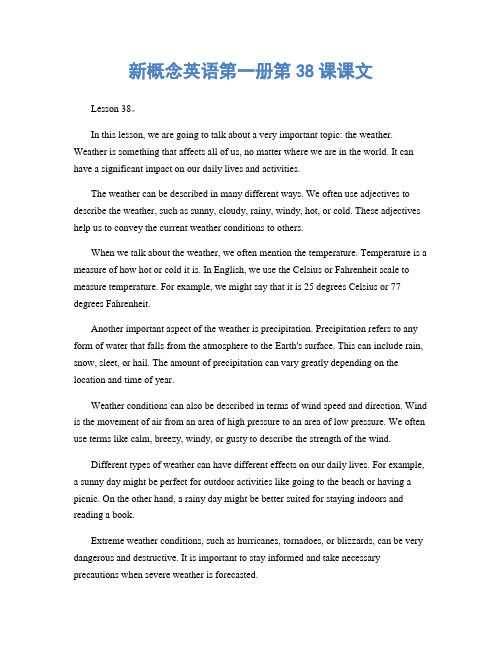
新概念英语第一册第38课课文Lesson 38。
In this lesson, we are going to talk about a very important topic: the weather. Weather is something that affects all of us, no matter where we are in the world. It can have a significant impact on our daily lives and activities.The weather can be described in many different ways. We often use adjectives to describe the weather, such as sunny, cloudy, rainy, windy, hot, or cold. These adjectives help us to convey the current weather conditions to others.When we talk about the weather, we often mention the temperature. Temperature is a measure of how hot or cold it is. In English, we use the Celsius or Fahrenheit scale to measure temperature. For example, we might say that it is 25 degrees Celsius or 77 degrees Fahrenheit.Another important aspect of the weather is precipitation. Precipitation refers to any form of water that falls from the atmosphere to the Earth's surface. This can include rain, snow, sleet, or hail. The amount of precipitation can vary greatly depending on the location and time of year.Weather conditions can also be described in terms of wind speed and direction. Wind is the movement of air from an area of high pressure to an area of low pressure. We often use terms like calm, breezy, windy, or gusty to describe the strength of the wind.Different types of weather can have different effects on our daily lives. For example, a sunny day might be perfect for outdoor activities like going to the beach or having a picnic. On the other hand, a rainy day might be better suited for staying indoors and reading a book.Extreme weather conditions, such as hurricanes, tornadoes, or blizzards, can be very dangerous and destructive. It is important to stay informed and take necessary precautions when severe weather is forecasted.In conclusion, the weather is an integral part of our lives. It can influence our mood, activities, and even our safety. By understanding and being aware of the weather conditions, we can better plan and adapt to our daily lives. So next time you step outside, take a moment to appreciate the weather and its impact on our world.。
新概念英语第一册单词表(可背默听写)
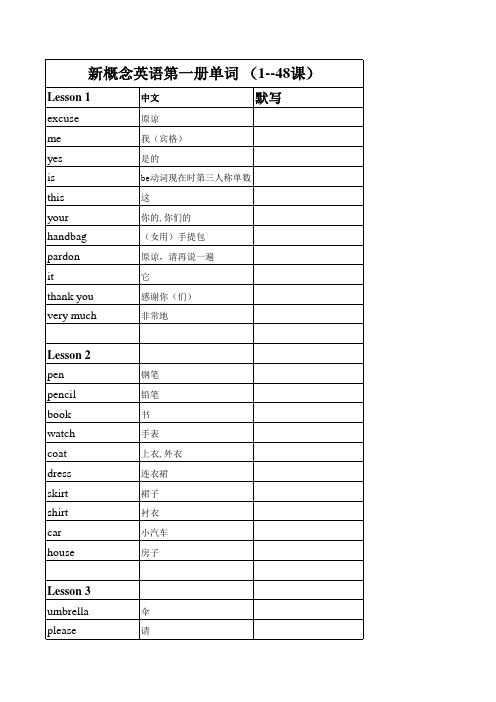
cake biscuit
饼,蛋糕 饼干
Lesson 47 like want
喜欢,想要 想
Lesson 48 fresh egg butter pure honey ripe banana jam sweet orange Scotch whisky choice apple wine beer blackboard
Lesson 9 hello hi how today well fine thanks goodbye see
喂(表示问候) 喂, 嗨 怎样 今天 身体好 美好的 谢谢 再见 见
Lesson 10
fat
胖的
woman
女人
thin
瘦的
tall
高的
short dirty clean hot cold old young busy lazy
灰色的 黄色的 黑色的 橘黄色的
Lesson 17 employee hard-working sales rep man office assistant
雇员 勤奋的 推销员 男人 办公室 助手
Lesson 19 matter children tired boy thirsty Mum sit down right ice cream
Lesson 34
sleep
睡觉
shave
刮脸
cry wash wait jump
Lesson 35 photograph village valley between hill another wife along bank water swim building park into
Lesson 36 beside off
Lesson 8 policeman policewoman taxi driver air hostess postman nurse mechanic hairdresser housewife milkman
新概念英语电子书

新概念英语第一册电子课本Lesson1Excuseme!对不起!Lesson2Isthisyour...?这是你的…吗?Lesson3Sorry,sir.对不起,先生。
Lesson4Isthisyour...?这是你的…吗?Lesson5Nicetomeetyou.特别欢乐见到你。
Lesson6Whatmakeisit?它是什么牌子的?Lesson7Areyouateacher?你是教师吗?Lesson8What'syourjob?你是做什么工作的?Lesson9Howareyoutoday?你今天好吗?Lesson10Lookat...瞧…Lesson11Isthisyourshirt?这是你的衬衫吗?Lesson12Whoseisthis...?Thisismy/your/his/her...这…是谁的?这是我的/你的/他的/她的…Lesson13Anewdress一件新连衣裙Lesson14Whatcolourisyour...?你的…是什么颜色的?Lesson15Yourpassports,please.请出示你们的护照。
Lesson16Areyou...?你是…吗?Lesson17Howdoyoudo?你好!Lesson18Whataretheirjobs?他们是做什么工作的?Lesson19Tiredandthirsty.又累又渴Lesson20Lookatthem!瞧瞧他们/它们!Lesson21Whichbook?哪一本书?Lesson22Giveme/him/her/us/thema...给我/他/她/我们/他们一…Whichone?哪一个?Lesson23Whichglasses?哪几只杯子?Lesson24Giveme/him/her/us/themsome...给我/他/她/我们/他们一些…Whichones?哪些?Lesson25Mrs.Smith'skitchen史密斯太太的厨房Lesson26Whereisit?它在哪里?Lesson27Mrs.Smith'slivingroom史密斯太太的客厅Lesson28Wherearethey?它们在哪里?Lesson29Comein,Amy.进来,艾米。
新概念1lesson39课文

新概念1lesson39课文Lesson 39: A worthy successorOnce upon a time, there was a wise and respected emperor who ruled over a vast empire. The emperor had no sons, so he began his search for a worthy successor. He invited all the young men of the empire to the palace and said, "I will give each of you a seed. Plant the seed and nurture it. In one year's time, bring back the plant that grows from this seed. Whoever brings back the most beautiful and unique plant will be my successor."The young men all eagerly planted their seeds and took great care of their plants. As time passed, each plant grew and blossomed into a beautiful flower. The young men were proud of their achievements and believed they would surely be chosen as the next emperor.However, there was one young man named Li Wei, who struggled to make his plant grow. He watered it diligently, but it remained small and weak. He was disheartened and felt like a failure compared to the other young men. Despite his disappointment, Li Wei continued to care for his plant with love and determination.One year later, all the young men brought their plants to the palace. The emperor was amazed by the variety of flowers that were presented to him. Each plant was unique and beautiful in its own way. However, one plant stood out among the rest. It was a small and delicate plant with vibrant purple blossoms. The emperor was immediately drawn to its beauty and elegance.The young man who brought the plant was Li Wei. The emperor asked him, "How did you manage to grow such adelicate and unique plant?" Li Wei replied, "Your Majesty, I struggled to make my plant grow. It was small and weakcompared to the others. However, instead of giving up, I showered it with love and care. I believed that every plant has its own beauty, and I nurtured it with all my heart."The emperor was deeply moved by Li Wei's answer. He realized that true leadership lies not in the ability to achieve greatness, but in the ability to persevere and care for others. The emperor declared Li Wei as his worthy successor, for he had shown compassion, resilience, and the understanding that greatness can be found in the smallest and most unexpected places.Li Wei's story reminds us that success doesn't always come easily and that greatness can be found in the smallest of things. It teaches us the importance of perseverance and resilience in the face of challenges. Like Li Wei, we should never give up on our dreams and continue to pour love and care into everything we do.In our modern society, where success is often equated with wealth and power, Li Wei's story serves as a reminder that true success lies in our ability to make a difference in the lives of others. We should strive to be leaders who not only achieve greatness for ourselves but also uplift and inspire others to reach their full potential.Li Wei's journey from struggle to success resonates with people from all walks of life. It teaches us that greatnessis not defined by external achievements, but by the kindness, compassion, and love we show towards others. It inspires us to see the beauty in the smallest of things and to believe in our own abilities, regardless of how small or weak they may seem.In conclusion, Li Wei's story of being a worthy successor reminds us that true leadership is not about achieving greatness for ourselves, but about nurturing and caring for others. It tells us that success is not always measured byexternal achievements, but by the impact we have on the lives of others. Li Wei's journey serves as an inspiration for us all to persevere, believe in our own abilities, and create beauty in the world around us.。
- 1、下载文档前请自行甄别文档内容的完整性,平台不提供额外的编辑、内容补充、找答案等附加服务。
- 2、"仅部分预览"的文档,不可在线预览部分如存在完整性等问题,可反馈申请退款(可完整预览的文档不适用该条件!)。
- 3、如文档侵犯您的权益,请联系客服反馈,我们会尽快为您处理(人工客服工作时间:9:00-18:30)。
特殊疑问句 e.g. What are you/we/they going to do? 你(们)/我们/他们要做什么? e.g. What is he/she going to do? 他/她打算做什么? e.g. What is your mother going to do? 你的妈妈打算要做什么?
Paint v. Paint ----painting e.g. Who is painting a picture? 谁在画画? Paint n. 油漆,涂料, 颜料
Wet paint!!
油漆未干!
Paint v. Painter n. 粉刷工,画家 Painting n. 油画,水彩画 Drawing n. 素描 Picture n. 泛指各种画,照片
Hammer n. 锤子
Paint v. 1)漆; 涂 2) 画 Paint + the bookcase + pink 谓语 宾语 补语
Pink 宾语补足语
Paint v. 结构:动词 + 代词/名词 + 形容词 Paint + the town + red 狂欢 谓语 宾语 宾语补足语 Paint the wall white 把墙刷白
Hard adj. 坚硬的,困难的,努力的 e.g. The ice is as hard as rock. 这块冰硬得像一块石头。 Hard-working Hard work Hard-hearted 勤奋的 艰苦的工作 心肠硬的
Make v. 做 Make ------making
Make the tea Make the coffee Make the bed 铺床 Make a meal 做饭 e.g. His mother is making a meal. 他的妈妈正在做饭。 e.g. Their parents are making the meal. 他们的父母正在做饭。
Work v. 工作 job n. 任何有报酬的工作(可数名词) e.g. He has a good job in the bank.\ 他在银行里有一份好工作。
Hard adv. 努力地 Work hard Take it hard 承受很深的打击 e.g. His brother died, and he is taking it hard. 他的哥哥死了,他正在承受着悲痛。
Favourite adj. 最喜欢的 n. 最喜欢的东西 e.g. These books are my favourites. = These are my favourite books. 这些是我最喜欢的书。 e.g. This kind of chocolate is my favourite. 这种巧克力是我的最爱。 这是我最喜欢的游戏。(该怎么说呢?)
Make it : succeed 成功了 e.g. I can make it. 我能成功!! Make up 化妆 e.g. She is making up her face now. 她正在化妆。 Make-up n. e.g. Too much make-up looks unnatural. 太多太浓的状看着不自然。
Pink
n. /adj. 粉红色的
Pink collar 粉领(指跟女性有关的办公室工作) White collar 白领 (坐在办公室里工作的人) Blue collar 蓝领(工人阶级) In the pink of health 身体很好
Favourite
adj.
最喜欢的
e.g. This is my favourite CD. 这是我最喜欢的CD。 --Am I your favourite student? 我是你最喜欢的学生吗? -- Yes, you are. -- No, you are not!
LESSON 37-38
1月13日
KEY WORDS AND EXPRESSIONS
Work v. 工作 Hard adv. 努力地 Make v. 制作,做 Bookcase n. 书架 Hammer n. 锤子 Paint v. 上漆,涂 Pink adj. 粉红色 Favourite adj. 最喜爱的
--- Is he going to clean the car? 他要洗车吗?
否定句:系动词后面加 not e.g. They are not going to work there. 他们不打算到那去工作。 e.g. She isn’t going to give her new pen to him. 她不打算把她的新笔给他。
e.g. What colour are you going to paint the bookcase? 你打算把书橱涂上什么颜色?
Work v. 工作 Work hard 努力工作 Hard work 艰苦的工作 Hard-working 勤奋努力
e.g. He is a hard-working employee. 他是个勤奋的雇员 e.g. We must work hard. 我们必须努力工作 e.g. That’s ha are going to swim in the river. 他们要去江里游泳。
疑问句:把系动词提前 -- Are you going to paint the bookcase pink? 你打算把书橱刷成粉色的吗? -- Yes, I am. No, I am mot.
用法: 2. 表示按计划,安排要发生的事。 e.g. The meeting is going to begin at nine. 会议将在9点开始。
用法:3.表示某件事即将要发生。 e.g. It’s going to rain. 天要下雨了! e.g. She’s going to faint! 她要晕倒了! e.g. The books are going to fall. 书要掉下来了!
Grammar ---- be going to 用法: 1. 表示打算要做某事。 e.g. My sister is going to visit her teacher tomorrow. 我的姐姐打算去拜访她的老师。 e.g. I am going to put the bookcase beside the desk. 我打算把书橱放在书桌旁边。
Bookcase n. 书橱, 书架 Bookshelf 书架 Bookworm 书虫,书痴 Bookshop = bookstore 书店 Book mark 书签
a closed book to sb. 对某人来说…..是一点也不懂 e.g. Music is a closed book to me. 我对音乐一窍不通。
结构: be going to do 1. to 后面一定要加动词原形。 2. be 按人称和数的变化而采取不同的形式。 Make a bookcase e.g. I am going to make a bookcase. 我打算做一个书橱。 Cook a meal e.g. She is going to cook a meal. 她要做一顿饭。
